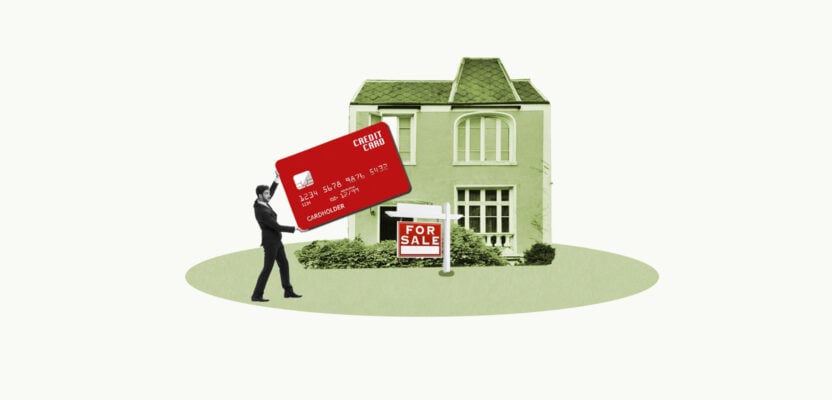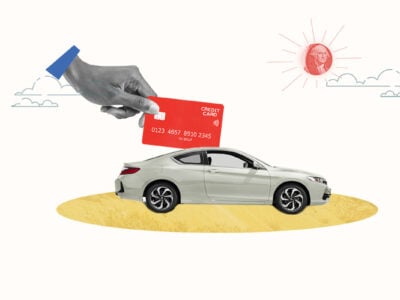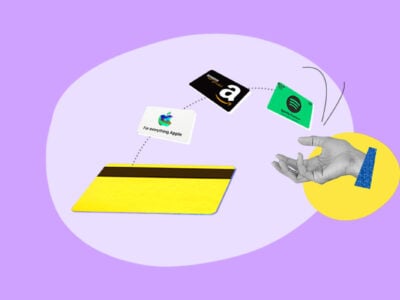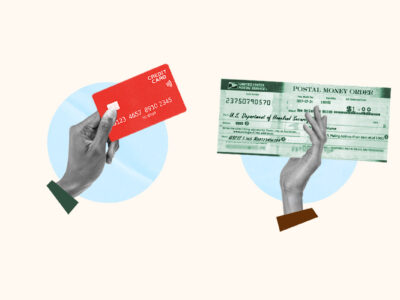For most people looking to buy a home, paying the full asking price upfront isn’t a realistic option. You usually need to get a mortgage—and if you’re worried you won’t be able to qualify for one, this can leave you in a bind.
If you already have a credit card, you might be wondering whether you can just use it to buy a house. Sure, it sounds unusual, but is it possible?
The answer is yes—it’s technically possible to use a credit card to buy a house (or another type of real estate). However, it has a lot of downsides, and it isn’t a good idea.
Table of Contents
How can you buy a house with a credit card?
You can buy a house with money from your credit card, but the transaction won’t be as straightforward as simply swiping it at a store.
Most realtors and home sellers won’t accept payments directly from your card because they don’t count as certified funds. In plain language, that means the transaction isn’t guaranteed to go through (because, for instance, you might dispute the charges afterward).
To make the purchase, you’ll need to perform a workaround:
- Get a cash advance: The first step is to get a credit card cash advance, which is a transaction that lets you get cash from a credit card (e.g., at an ATM).
- Buy a cashier’s check: You can then use the cash you borrowed to buy a cashier’s check at a bank or a credit union. This is a type of check that you pay for in advance (which means it can’t bounce). It’s very common to pay for real estate with cashier’s checks.
- Use it to buy the house: Just give the check to the realtor or seller. It will count as certified funds, so they’ll accept it.
As you’d expect, the biggest barrier to pulling this off is price. According to Experian, in 2021, the average credit card limit was around $30,000, whereas in 2022, the average house sold for over $450,000. 1 2
This means that to buy a house with a credit card, you’ll probably need to use multiple credit cards, and they’ll need to have unusually high credit limits. That’s unless you’re buying in a very cheap market, such as certain neighborhoods in Detroit, where (somewhat infamously) there are houses that sell for as little as $100–$1,000. 3
Can you use a credit card for the down payment on a house?
No, you can’t usually use a credit card to make a down payment on a home, even if you use the workaround above. If you want to pay with your credit card, you have to buy the house outright.
Most mortgages (including conventional mortgages and FHA loans) strictly forbid the use of unsecured loans like credit card cash advances for a down payment. 4 5
In addition, many mortgage lenders require you to use “seasoned funds” for a down payment—in other words, money that’s been sitting in your bank account for at least 60 days. 6 Even if paying with a cash advance was allowed, you’d have to take out the money well in advance (and pay a lot of interest on it while you waited for it to season).
Why buying a house with a credit card is a bad idea
Using a credit card to buy a house is an unconventional approach, and one we don’t recommend. The cash advance workaround that we described is a bad idea for several reasons:
Extremely high interest rates
Credit cards have much higher interest rates than mortgages. As of October 2022, the average mortgage interest rate was 7.08% for a 30-year fixed-rate mortgage. 7
For comparison, the table below shows how much higher average credit card interest rates were in 2020. 8 9
Average Credit Card APR by Credit Score
| Credit Score Classification | Credit Score Range | Average Credit Card APR |
|---|---|---|
| Superprime | 720–850 | 17.5% |
| Prime | 660–719 | 21.0% |
| Near-prime | 620–659 | 22.6% |
| Subprime | 580–619 | 23.3% |
| Deep subprime | 300–579 | 23.9% |
Credit cards have high interest rates because, unlike loans, you don’t have to carry a balance on them from month to month, and if you pay off your credit card in full, you won’t pay any interest at all.
However, paying off a purchase as large as a house in just a month is impractical. Assuming you can’t pay it off instantly, you could easily end up paying thousands of dollars more in interest than if you’d just gotten a mortgage.
Note that cash advances often come with added cash advance fees and higher interest rates, so you might end up paying even more than you would on a normal credit card purchase.
Lower financing that limits your options
With a credit card, you can only buy a house that’s being sold within your cash advance limit. (This might or might not be different from your overall credit limit, depending on the card you have.)
While you may be able to afford one of the cheaper houses on the market, you won’t be able to consider higher-valued properties that you’d be able to afford with a mortgage.
What’s more, most houses that are cheap enough to buy with a credit card are likely to be in bad shape. You’ll need to factor in additional costs if the house needs renovation or construction work to make it livable.
Damage to your credit score
When you rack up huge charges on a credit card, you increase your credit utilization rate (the amount of available credit you’re using), which hurts your credit score.
Since a house is a major purchase, you’ll probably need to use most of your available credit to cover the cost. You might even need to max out your credit card completely.
Carrying such a high balance on your credit card will hurt your score because it indicates that you may be a higher risk to lenders.
No credit card rewards
If you’re considering using your credit card to buy a house because you want to take advantage of your card’s welcome bonus or rewards scheme, think again. Most credit cards don’t allow you to accumulate rewards points on cash advances, which is the way you’d pay for the house by card.
You also probably won’t be able to take advantage of introductory 0% APR offers, since these often exclude cash advances as well. 10
All this is to say that when it comes to buying a new home, using your credit card comes with severe disadvantages and virtually no advantages.
Other ways to finance a house
If you have a high enough credit limit that you can afford to buy a house using your credit card, then it probably means you have a good credit score (or at least good enough credit that your card issuer feels that they can trust you with access to a large credit line).
In this case, your best option is probably to just apply for a traditional mortgage. You’ll be able to qualify for home loans with favorable terms and low interest rates.
However, if for some reason you’re sure you don’t want one, there are several other options you can explore.
Alternatives to a traditional mortgage
Consider these home financing options instead:
- Chattel loans: Chattel loans are a type of personal property loan, and they have looser requirements than traditional mortgages. Although these loans are harder to get and often come with higher interest rates, they’re a good option for buying property that wouldn’t qualify for a conventional mortgage, such as a manufactured or mobile home. 11
- Short-term mortgages: Many people don’t want to commit to 30 years of mortgage payments. Fortunately, you can find home loans with shorter repayment periods (like 10 or 15 years). 12
- Personal loans: You might be able to use a personal loan to buy a house. 13 While you may not get the low interest rates that come with a mortgage, your rates still won’t be nearly as high as they would have been if you used your credit card.






